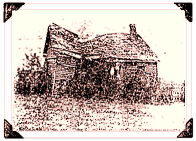Page 3.
As to the Church building, Gregg's obituary 1910 states that the Church was "abandoned, an unsightly ruin." Preserved for us today is a snapshot taken in 1930. Soon after the building was cleared away by Henry Hartman and sons. Today, 1970, the prairie has not quite reclaimed the spot where the Church stood. The yard has been cleared of the ugly unsightly growth, free of the hedge that surrounded it. Today it is a calm, well kept location, thanks to Melvin Bredemeier's care. The graves, some surrounded by their original iron fence and with beautiful stately monuments, are silent. For quite a distance, as one travels north on Highway 63, or west on Highway 71, one can see the beautiful Scotch pine tree. It stands near the William Clark grave. William Clark was the last to decease of the original
13.
THE CEMETERY. The Scotch Valley cemetery occupies 2 acres in the extreme SW corner, Sec. 15 TI R12 Nemaha Township of Nemaha Co, Kansas. "Jimmy" Gregg acquired that 1/4 sec. June 4 1872. Not until 1895 do we find record of transfer of the 2 acres to the cemetery
association. Today, 1970, the burial plots are well kept by Melvin Bredemeier. He makes prairie hay from the remainder of the 2 acres. There is no fencing, no shrubs, just two trees. A beautiful Scotch pine and a cedar tree. There are some 23 markers and monuments. There are possibly several unmarked graves. The earliest stone is John Baird, 1872, brother-in-law of James Gregg. It seems that Gregg had just acquired that 1/4 Section. We are not sure, but the church with its growing pains may have selected this spot as their Church site and may have done the surveying for graves at this
time. There are no recorded burials here, earlier than 1872. Possibly because the 60's and the early 70's was the time of the Scotch settlements. At first the yard was used by the Scotch only, but as neighbors of other nationalities came, that was changed. In the County Register of Deeds office of Nemaha County, this cemetery is recorded as a public burial ground on October 21, 1895. A charter was filed on the state level also. This was learned from the Kansas State Historical Society of
Topeka. Eventually, for different reasons no doubt, the Scotch moved away. Several families went to Canada. I believe today that Hila Werner Rilinger is the only one of Scotch lineage that lives near this cemetery. Mr.& Mrs. Dick Rilinger live in Clear Creek
Township. This is a copy of a receipt of payment for a lot in the Scotch Valley Cemetery, thanks to Mrs. May Hartman. (Lot for her
brother). April 23, 1907, the Scotch Valley Cemetery Association received $5.00 from Albert Whaley for Lot No.43 Block C Eastern Division, the afore said Lot southwest corner, southwest quarter Section 15, Township 1 Range 12. For Samuel Levi Whaley, born June 20, 1903, died June 23, 1903. Signed, John Baker, President. William Clark, Secretary. Scotch Valley Cemetery Association.
|
